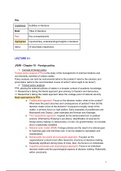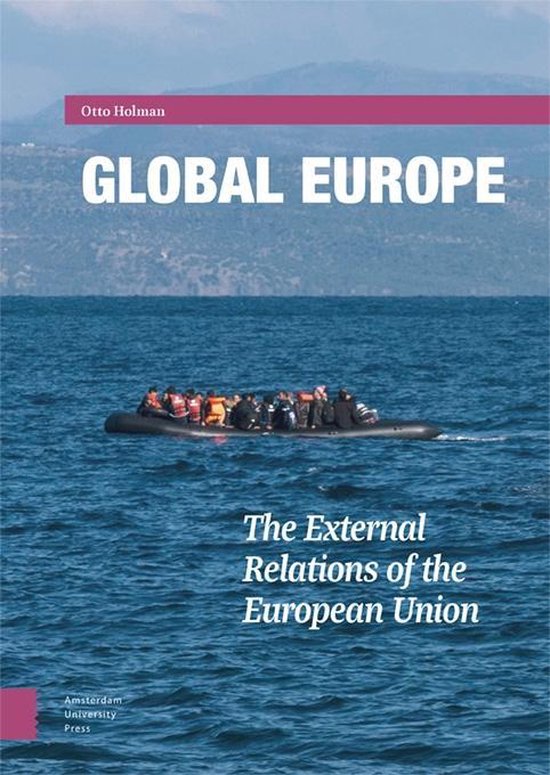Key
Underlined Subtitles in literature
Bold Titles of literature
Red Key concepts/points
Highlighted Important/key understandings/insights in literature
Italics Of secondary importance
LECTURE II.1
J/S/M - Chapter 10 - Foreign policy
1. Concept of foreign policy
Foreign policy analysis (FPA) is the study of the management of external relations and
non-domestic activities of nations states.
Policy analysis can both be instrumental (what is the problem? what is the solution) and
prescriptive (what is the recommended course of action? what ought to be done?)
2. Foreign policy analysis
FPA: placing the external policies of states in a broader context of academic knowledge.
=> Researcher’s taking the liberal approach give primacy to freedom and democracy.
=> Researcher’s taking the realist approach takes the vantage point of national security.
Major approaches to FPA:
a. Traditionalist approach: Focus on the decision-maker: what is the context?
What were the past outcomes and consequences of policies? How did the
decision-maker arrive at the decision? It required a lengthy study of the
matter. A primary focus on high politics. Early examples of practitioners are
Machiavelli and Grotius. Later examples are Kennan and Kissinger.
b. The comparative approach: Inspired by the behavioralist turn in political
science. Informed by Rosenau’s pre-theory: identification of sources for
foreign policy-making: (i) idiosyncrasy, (ii) role, (iii) governmental, (iv) societal,
and (v) systematic variables.
c. Rational actor model (RAM): Foreign policies are the result of a rational goal;
to maximise gain and minimise cost. It can be related to neorealism and
neoliberalism.
d. Bureaucratic structures and processes approach: Focuses on the
organisational context (most often hierarchic structure) of decision-making.
Especially significant during times of crisis. Also, the focus is on individuals.
e. Cognitive processes and psychological approach: Focus is on individual
decision-maker and the psychological aspects of decision making. Rationality
within constraints.
1
, f. Multilevel and multidimensional approach: Accepting that there is not one
overarching theory of FPA and, thus, incorporating multiple
theories/approaches in their analysis.
g. Social constructivist approach: Focuses on the role of ideas, discourses, and
identity. Constructivists trace the influence of ideas, discourses and identities
on foreign policymaking.
3. How to study FPA: A level-of-analysis approach
The level-of-analysis is a three-level analysis (individuals, states, systems):
a. The systemic level
=> Explaining foreign policy from conditions of the international system.
=> Different theories of the international system (e.g. the realist understanding of
international anarchy), however, lead to different ideas about how states will behave.
For instance, through the realist approach, it is evident that great powers have more
leeway whereas small powers are more constrained by the international system.
=> IR approaches (liberalism, social constructivism, realism etc.) can help inform the
international system which, in their respective ways, will affect foreign policy goals.
b. The level of the nation-state
Here, the realist notion is that it is important to examine the connection between a
country’s government and society - more precisely, the government’s ability to extract
resources from the population for foreign policy purposes. The focus is on state
power, not national power. The realist view is state-centred.
Liberals believe that society plays an important part in the making of foreign policy.
International relations are carried out by more actors that the government and
liberal/democratic states have more peaceful relations with each other. The liberal
view is society-centred.
The making of policy within domestic governments:
- The RAM approach stresses that governments make the best possible
decisions using a cost and benefit analysis.
- The bureaucratic approach stresses that decision-making is a process where
individuals compete over power and position.
- The group-thinking approach stresses that it is possible for a group to neglect
‘better’ alternatives and, therefore, become dumber than the individual
decision-maker.
c. The level of the individual decision-maker
Both individual cognitive constraints and beliefs are important in the process of
decision-making. These are affected by four things:
i. The content of the policy-makers beliefs
ii. The organisation and structure of the policy-makers beliefs: are they
coherent or fragmented?
iii. The common patterns of perceptions or misconceptions: e.g. the
biased view of the stereotype image of the opponent.
iv. The cognitive rigidity/flexibility for change and learning: e.g.
Gorbachev’s ‘new thinking’ during Soviet economic and political crisis.
By way of conclusion:
- Foreign policy is more prone to circumstances of uncertainty/imperfect
knowledge
2
, - Most knowledge is known in retrospect
4. A note on experts and think tanks
Think tanks are used to give advice on foreign policies, e.g. The Rand Corporation
(established at the beginning of the nuclear age and took a technical/scientific approach).
What distinguishes American think tanks from their international counterparts, is that
policymakers regularly turn to them for advice.
Holman - Chapter 2 - Foreign Policy Theories and the External Relations of the
EU
Foreign policy or the EU’s external relations are regularly defined as involving defence,
diplomacy, economic relations, and cooperation.
A common military within the EU remains a dream says Moravcsik. More integration is
simply unlikely in such sovereign sensitive areas,
The external relations (especially those outlined in the Treaty of Lisbon) of the EU has yet to
be handled sufficiently theoretically.
1. The study of foreign policy
a. Rational choice theory
Within in the neoliberal and neorealist approaches states are rational and unitary
entities, and thus they act out of enlightened self-interest. However, this idea has
been criticised. First, the state is not a unitary actor. Second, rationality assumes an
optimal acquisition of knowledge. Third, psychological and cognitive factors may limit
rational choice. Fourth, a situation of crisis requires shift decisions that can not bear
the burden of time-consuming enlightenment.
b. The bureaucratic political approach
Actors within the state apparatus do not work in unison, rather they compete - this
even includes withholding information to achieve aims. The EU is a cacophony of
voices and interests in its predominantly intergovernmental setting.
Sometimes non-elected officials and civil servants take part in the preparatory,
decision-making and implementation phases of foreign policy. Group-thinking might
be the cause of a group making a non-optimal decision due to the traditions and
internal discipline of that group.
c. Cognitive/constructive approaches
Group thinking and group discipline is part of social interaction. Here the role of
ideas, identities and psychological factors are key.
Strategic culture: Relating to a cultures particular traditions and deep-rooted ideas
that have established themselves in the realm of external relations => Differs too
much within the EU and, therefore, a common defence is unlikely.
Normative Power Europe argues that the EU has soft power in its ability to define
what passes as normal.
Christopher Hill coined the term, the capability-expectations gap: Successful
economic integration => Rising expectations in third countries, although a gap exists
between these expectations and the actual capabilities of the EU.
Europeanisation literature focuses on tensions between national foreign policy and
the EU external relations:
i. Upward Europeanisation: EU policy based on national policy
3
, ii. Downward Europeanisation: National policy determined by EU policy
iii. Outward Europeanisation: The normative/transformative role of the
EU to third countries
d. Comparative political economy
This approach seeks to identify relevant independent variables to explain what
influences foreign policy. Of these are the following:
i. Geographic location (close to trading routes or unstable countries?)
ii. Socio-economic development (more development leads to being more
internationally oriented)
iii. The type of political regime
iv. Character traits of political leaders (especially in times of crises)
v. National identity and foreign policy traditions
e. Towards a synthesis: power, prosperity, institutional configurations and
identity
The historic context has a considerable role on EU’s external relations. First, states
changes asynchronous (historical relativism). Second, as the international context
change so does foreign policy. Important to note is that the EU is not a stationary
entity.
The historic global context is key to understanding the behaviour of collectives.
Social cohesion is the political tolerability if levels of economic and social disparity
that exists and are expected in the EU and of the measures meant to deal with it.
Ultimately a country’s foreign policy is partly a reflection of the unequal distribution of
welfare and power.
Hadfield came up with four grouping of regional value sets:
i. Northern member states grouping: Denmark, Sweden, Norway,
Finland, and the three Baltic countries
ii. Western member states grouping: Great Britain, Ireland, Netherlands,
Belgium and Luxembourg
iii. Eastern member states grouping: Austria, Poland, Czech Republic,
Slovakia, Slovenia, Hungary, Bulgaria and Romania.
iv. Southern member states grouping: Greece, Italy, Spain and Portugal
(who are similar in their stress on upward Europeanisation)
v. Central member states grouping: Germany and France
=> All groupings are quite arbitrary
The pluralist nature of the EU is not pluralism of equality.
2. The EU as an actor in the world
The EU as an actor (actorness) is composed of external and internal factors:
- External factors refer both to the level of exclusive competences in policy areas and
the external perception of the EU in third countries
=> What impact will the anti-Western resentment have on the EU’s external
power?
- Internal factors refer to
- the cohesion: whether the national preferences are shared, whether the
national preferences are turned into common policy and whether this common
policy is actually implemented + social equality, and;
- the capacity (e.g. to unite) and the means (legal, military and financial).
4





